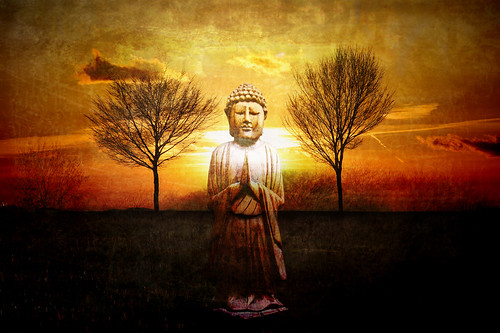
Excellent article - the most important practice any Buddhist can have, in my opinion, is how we conduct ourselves in our daily lives. Coming away from the cushion or returning from retreat, the key challenge is to bring our presence and wakefulness with us to the rest of our lives.
Real World Meditation: Why Being Present Matters
By David Nichtern, Senior Shambhala Buddhist teacherPosted: July 1, 2010Last Wednesday night I completed a 12 day silent meditation retreat at Karme Choling, Shambhala International's Buddhist Meditation Center in Vermont. Literally as soon as it was over at 11:30 p.m. I said my goodbyes, got in my car with a friend and drove the six hours back to New York City. After driving all night I arrived home at around 6 a.m. I slipped into bed with Cyndi and Leroy Brown (our chocolate toy poodle) and took a nap for an hour, then got up, re-packed my bag, put on my black suit, and grabbed a taxi to go to JFK Airport at 10 a.m.
Landing in LA, I picked up a rental car and drove straight to the Beverly Hilton just in time for the ASCAP Film and TV awards. The very next night I headed over to the Westin Bonaventure for the Daytime Emmy Awards. I was up for one for the music we composed for One Life to Live.
This trip provided perhaps an unusually stark contrast coming out of retreat, but even in less stressful circumstances, the experience of participating in an intensive meditation retreat and then returning to our ordinary life can provide an extremely vivid transition, and with that a chance to see our habits and patterns in high relief.
On this occasion my perception was that people are just people -- we are all basically living in a dream of expectation and disappointment, with an occasional moment of wakefulness shining through. In the retreat, the awake moments were accented; at the Emmys the expectation and disappointment felt thick and solid and heavy by comparison. Anyhow that was my perception in transition.
From a certain point of view, going on an intensive meditation retreat is a radical thing to do. There are so many ways we can spend our time, so many vacations we still want to take, so many places to go, things to see and do. The idea of dedicating a weekend, a week, or longer to practicing meditation can easily slide to the bottom of the "to do" list.
It can be so helpful to understand the "view" of any particular practice we undertake, particularly retreat practice -- what are we going to be working with, how are we going to go about it and how can we manage whatever dramas unfold, both internal and external.
The essential quality of meditation practice on retreat is that by simplifying our world to the bare essence of simply being present, we have an unparalleled opportunity to see how our own mind works -- to actually see the lenses and filters through which we experience our reality.
It is the one activity we participate in that is reductive rather than additive. There may be some techniques involved -- we may be cultivating mindfulness or loving kindness and compassion, but essentially we are simply resting naturally in our present awareness and seeing whatever arises with an open impartial mind.
Along the way we may experience intense boredom, frustration, emotionality, peace, happiness, spaciousness and all the rest of it, but the one thing that is clear is that whatever we are experiencing is being generated by our own state of mind. The practice is a mirror so we can see ourselves more clearly and accurately, and hopefully develop more compassion for ourselves and thereby for others as well.
Re-entering our everyday world after a period of 20 minutes or two weeks of meditation practice, we have the opportunity to see ourselves entering the action. Of course, we may also have a heightened sensitivity to the obscurations, fear and cloaking -- what we call in Shambhala the "cocoon" -- the web of habitual patterns and manipulation that passes for authenticity but is really a kind of camouflage.
Unlike short bursts of meditation, retreat practice allows us to go much deeper into our exploration of what is really going on in our mind and heart. Coming out of retreat is an equally challenging and important part as we begin to integrate what we have gleaned into our everyday reality.
If you've done any kind of retreat practice and feel like chiming in about it, let's hear what it was like for you!
Follow David on his website (www.davidnichtern.com), facebook (facebook.com/davidnichtern), twitter (twitter.com/davidnichtern), or youtube (youtube.com/davidnichtern)
No comments:
Post a Comment